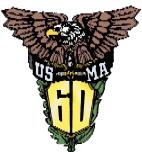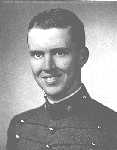
 |

|
|
|
Cullum No. 22745 Drowned 19 December 1960 In Ranger Training at Eglin Air Force Base, Florida Aged 21 Interment: West Point Cemetery, West Point, NY Michael was born at the Post Hospital, West Point, New York on 21 March 1939, the son of Major General (then Captain, CE) (USMA ’28) and Mrs. Thomas A. Lane, and grandson of Colonel (USMA ’09) and Mrs. C.C. Gee. Spring never held greater promise. He was a fine healthy youngster, and his 10 pounds, 12 ounces, established a new hospital record. He followed the varied life of his father’s Army
career – in Panama; Fort Belvoir, VA; Washington, D.C.; Maxwell Air
force Base, Ala.; Little rock, Ark.; Okinawa, R.I.; and Fort Monroe, VA.
The two years of his father’s absence in World War II were spent with his
maternal grandparents in Golden, Colo. He was a restless, inquisitive,
energetic, and sensitive child.
Changing schools posed no problems for him. In the Okinawa Dependents School, he won medals in scholarship and citizenship. After two years at Falls Church High School, he was invited to join the National Honor Society. A move to Fort Monroe and St. Vincent de Paul High School, in Newport News for four months was followed by a return to Washington, D.C. There Michael attended Archbishop Carroll High School and graduated at the head of his class in 1956, with medal awards in mathematics, English, and general excellence. The military career was not thrust upon him. Because of his great gifts in the field of science, we thought he might prefer to pursue special studies in physics. He was offered a very liberal scholarship to study physics at an eastern university. However, when competitive examinations were announced for a West Point appointment for the District of Columbia, Michael expressed a desire to compete. Though he had only a day’s notice, he led the competition and received his appointment to the Class of 1960. When we visited him in September, he said, “From the very first day of beast barracks, I had a feeling that this is the place for me.” The problems of plebe year were taken in stride. Michael moved easily into the routine of cadet life. He never wavered in his enthusiasm for the Corps of Cadets and for the Army. Michael was youthful in his enthusiasm and idealism, but mature in his wisdom about God and man. He was devout in the unaffected manner of one who sees life and death, here and hereafter, as one continuing plan of Providence. He had tolerance of and sympathy for his fellow man, which reflected perception and wisdom beyond his years. He cared deeply and pridefully about his position as a cadet. He was devoted to his class, and his friends, seeking to be helpful to all. He was fun-loving and serious, cheerful and conscientious, loyal to his ideals and principles, modest and unconcerned about fame and fortune. In his friends and his work and his activities, he found great happiness in his years in the Corps. He enjoyed the challenge of his studies and the excitement of the Army sports programs. He had a good baritone voice and was fond of music. He sang in the Catholic Chapel choir and in the Cadet Glee Club. He pursued his interest in chess, and in his First Class year, served as President of the Chess Club. He was a skillful bridge player and counted the game one of his chief pleasures. Michael had a well-coordinated physique of medium size and strength. He played good tennis and golf, was a strong swimmer and a qualified Red Cross senior life saver. He accepted as a matter of course the Academy doctrine that soldier should develop his maximum physical potential. He accepted his commission as a Second Lieutenant in the Corps of Engineers with deep pride and dedication. He was determined to be the best of soldiers and showed that determination in seeking airborne and ranger training and a first station with an armored division overseas. He completed the engineer Officer Orientation Course at Fort Belvior on 13 October 1960, and the Airborne Course at Fort Benning on 17 November 1960. He enjoyed the challenge of these courses and was happy in this beginning of his career as an officer. He was on the last problem before Christmas in the swamp and jungle phase of ranger training when he met death. Michael had a blithe spirit, compounded of his faith and his idealism. He felt a soldier should be unconcerned about danger and dying, that he should do his duty and accept the consequences. He was optimistic, enthusiastic, philosophical. On the morning of 19 December 1960, Michael was on a patrol exercise. In a night of subfreezing temperatures, his patrol had made a swamp crossing and then had waited long hours by the river bank before beginning the river crossing. The lead man secured the crossing rope and three men followed. It was daylight when Michael began to cross on the rope. Because he was a strong swimmer, he had been given the pack of the lead man to carry in addition to, and securely fastened to, his own. He apparently lost consciousness from cold exposure and exhaustion and slipped from the crossing rope at mid-stream. The prescribed rescue procedures were initiated by the patrol, but proved ineffectual in the cold, murky and deep water. Michael was buried at West Point on 22 December 1960. Monsignor Moore and Father McCormick, who had been his spiritual counselors for four years, said the funeral mass and final prayers. Members of the choir in which he served a few months earlier sang the Mass. Officers who had been his instructors served as honorary pallbearers. His body was laid to rest in a hallowed place, in the land he loved. Michael was a loving son and brother who found his greatest pleasure in the family circle. He visited home at every opportunity and seemed happiest in the company of his brother and sister. He had a keen sense of family pride and unity which extended to his many relatives. His Grandmother Gee wrote to us, “Michael was the finest young man I have ever known.” A friend who knew him only briefly wrote of “…his sunny personality, his obviously great degree of self-possession; acquired, I am positive, from a peace within resulting from a closer than average relationship with his Heavenly father.” A priest, teacher, and devoted friend wrote, “Mike was the finest student I have ever had.” His quiet dignity, easy manner, and generous spirit struck responsive chords in family and friends. Michael gave his life to the duty before him, even as he expected that he might one day be called to give it in battle. We mourn the passing of his brave and gracious spirit, the closing of high hopes of human service. Heaven has claimed its own.
--T.A. Lane
|